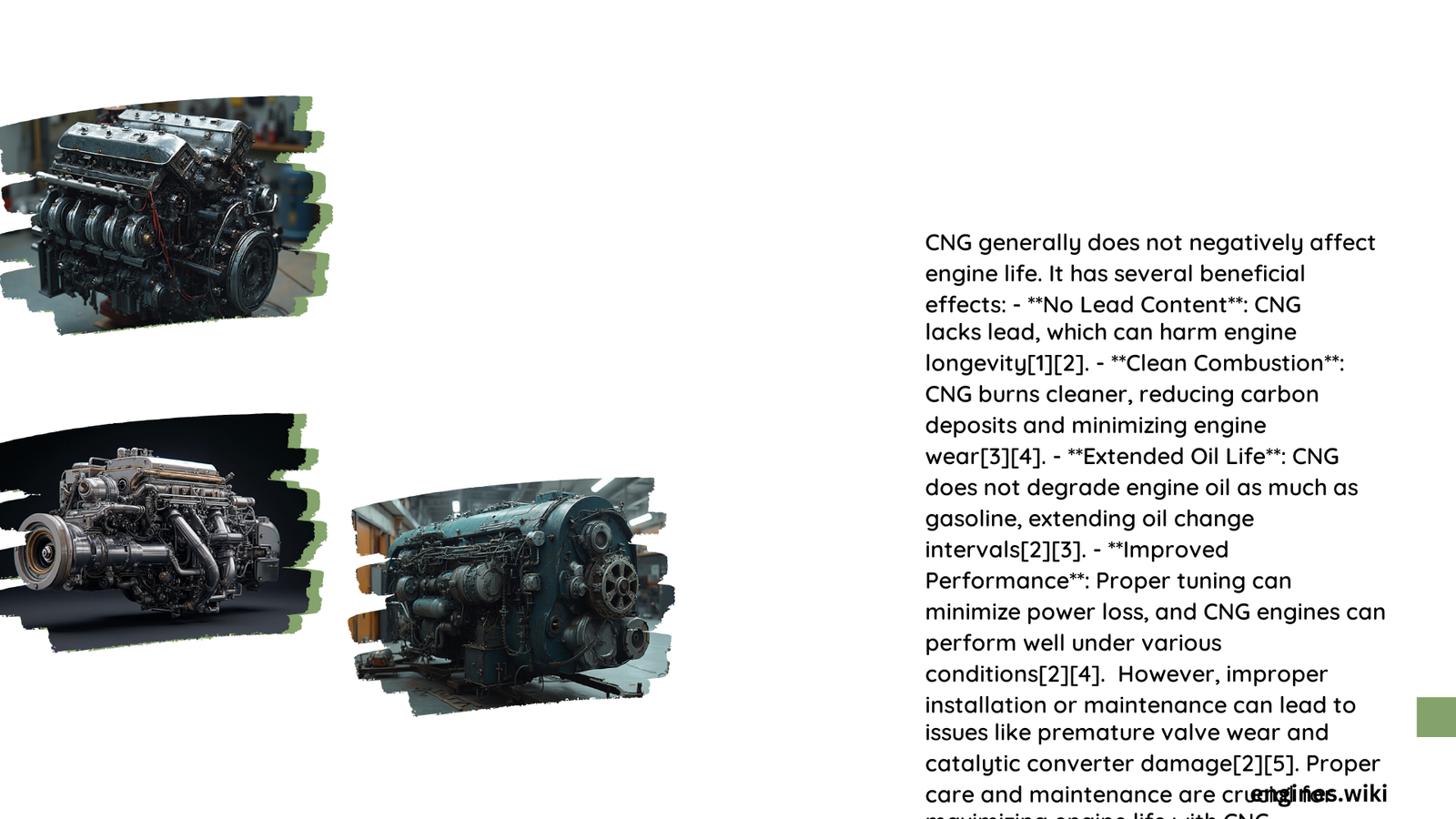Natural gas vehicles have gained significant attention for their potential environmental benefits and cost-effectiveness. Vehicle owners and fleet managers frequently question whether compressed natural gas (CNG) impacts engine life, performance, and long-term durability. Understanding the intricate relationship between CNG combustion and engine components reveals nuanced insights into potential wear mechanisms, maintenance strategies, and overall vehicle longevity.
What Happens to Engine Components with CNG?
CNG introduces unique combustion characteristics that distinctly interact with engine mechanisms. Unlike traditional liquid fuels, natural gas presents different thermal and chemical properties that influence engine wear patterns.
Temperature and Combustion Dynamics
| Fuel Type | Combustion Temperature | Potential Wear Impact |
|---|---|---|
| Gasoline | Lower (~2100°F) | Standard wear patterns |
| CNG | Higher (~2500°F) | Increased thermal stress |
Key observations about CNG’s thermal behavior include:
– Higher combustion temperatures
– Reduced carbon deposit formation
– Potential for accelerated valve wear
– Requirement for specialized lubricants
Does CNG Cause Faster Engine Degradation?
Contrary to common misconceptions, CNG does not inherently cause faster engine degradation when properly maintained. Research indicates that:
- Clean burning properties reduce internal carbon accumulation
- Specialized conversion kits minimize potential wear mechanisms
- Proper maintenance intervals can extend engine life
- Reduced friction from cleaner fuel combustion
Maintenance Strategies for CNG Vehicles
Effective CNG engine preservation requires targeted maintenance approaches:
- Oil Selection: Use specialized natural gas engine oils
- Interval Management: Extended service periods
- Tuning Frequency: Annual electronic calibration
- Component Inspection: Regular valve and seat assessments
Performance and Longevity Metrics
Fleet studies demonstrate compelling evidence regarding CNG engine performance:
– Maintenance cost reduction up to 40%
– Extended oil change intervals (10,000-25,000 additional miles)
– Comparable engine lifespan to traditional fuel vehicles
– Minimal power output reduction (approximately 5%)
Critical Factors Influencing CNG Engine Health

What Determines CNG Engine Durability?
Several interconnected factors contribute to CNG engine longevity:
– Quality of conversion kit installation
– Adherence to manufacturer recommendations
– Use of appropriate lubricants
– Regular diagnostic assessments
– Driving conditions and usage patterns
Potential Wear Mechanisms
Specific engine components potentially experiencing stress include:
– Valve seats
– Combustion chamber surfaces
– Piston rings
– Cylinder walls
Mitigation Strategies
Proactive approaches to minimize potential CNG-related wear:
– Select reputable conversion kit manufacturers
– Utilize manufacturer-approved components
– Implement rigorous maintenance schedules
– Monitor engine performance metrics
– Invest in specialized diagnostic equipment
Technical Considerations for CNG Adoption
Economic and Performance Implications
While CNG presents numerous advantages, understanding its technical nuances remains crucial for informed decision-making:
– Lower fuel costs
– Reduced environmental impact
– Potential for extended engine life
– Minimal performance compromise
Conclusion
CNG’s impact on engine life is complex and multifaceted. Proper implementation, maintenance, and understanding of natural gas vehicle technology can mitigate potential wear concerns, potentially offering comparable or superior engine longevity compared to traditional fuel systems.
Reference:
– Pakwheels CNG Effects Study
– SkyCNG Conversion Insights
– Infineum Technical Report
